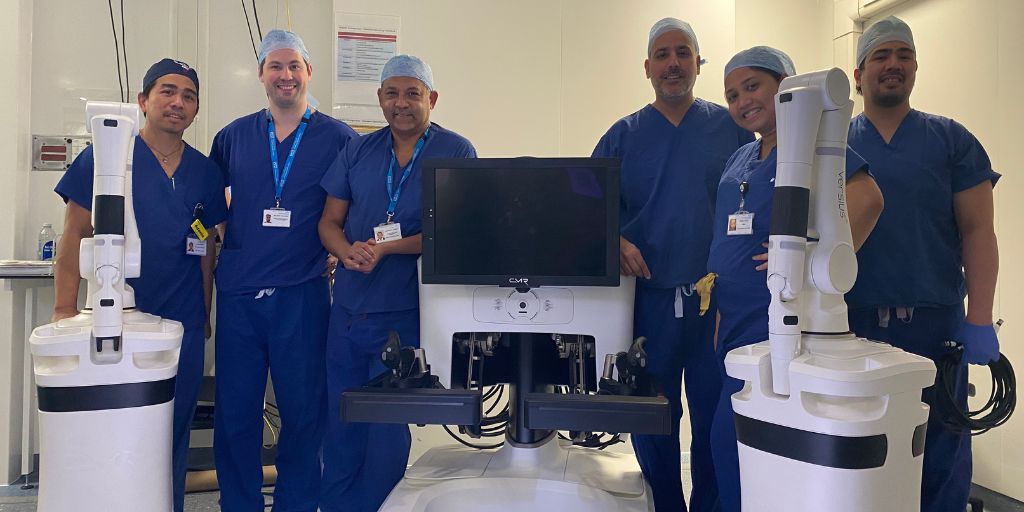
A team from Guy’s and St Thomas’ have become the first in the world to operate through a patient’s mouth using the Versius robotic surgery system.
This less invasive approach, known as transoral robotic surgery (TORS), can remove cancerous and benign tumours growing in the mouth and throat and speed up the patient’s recovery time. The technique is well established but has never been performed with this newer surgical robot.
The Versius robot has previously been used to treat urology patients, but as part of a research study by Guy’s and St Thomas’ and King’s College London, it has now been used for TORS.
So far, ten patients have been treated with Versius using this technique, including 75-year-old Barbara Jones from Upminster in Essex. The grandmother of three had two benign cysts removed from her throat.
Barbara said: “When I first heard that I was going to be operated on by a robot, I said to my son ‘R2-D2 is doing my surgery’! I knew nothing about robotic surgery before, but it’s remarkable what they can do now.
“It feels strange to be one of the first people to have this but I was more worried about just going into hospital and getting rid of the pain. It feels a lot better now.”
The Versius robotic system, consists of four modular robotic arms and is designed and built in Cambridge by CMR Surgical. During a robotic procedure, surgeons control the robotic instruments while sitting at an open console in the same room with a 3D HD view. One of the robotic arms controls a camera, to see inside the patient.
Barbara was operated on by Guy’s and St Thomas’ robotic head and neck surgery lead Mr Asit Arora along with Mr JP Jeannon, head and neck consultant surgeon.
Mr Arora pioneered TORS in the UK in 2009 with a different robotic system, and now teaches robotic surgery to clinicians across the country and Europe. He said: “Going through the mouth with a robotic system allows surgeons to safely operate in a tight, small space which is surrounded by important blood vessels and nerves.
“The Versius robot uses miniaturised surgical instruments that are perfect in such a small operating space. In addition to the enhanced 3D view, Versius allows the surgeon to make relatively big movements on the console that can be scaled down to allow precise, small movements in the operative space.
“Before TORS, we would have had to have done bigger, more invasive operations with a much longer recovery time for our patients.”
For some patients, the minimally invasive approach can mean they need smaller doses of further treatments like radiotherapy or chemotherapy, or it may result in them avoiding the need for additional treatments altogether.
Guy’s and St Thomas’ has the largest robotic surgery programme in the UK, with six robots operating across six specialties: urology, thoracic, head and neck, gynaecology, transplant and gastrointestinal.
The configuration of Versius to be able to operate through the mouth was made possible thanks to a PhD study by head and neck research fellow Jack Faulkner, supervised by Mr Arora and Professor Sebastien Ourselin, Head of School of Biomedical Engineering and Imaging Sciences at King’s College London. It was a project that brought together clinical, academic and industry partners.
Jack said: “The main consideration is we work in a much smaller environment so all the instruments have to pass through the mouth and be located closer together. It’s more challenging to use robotic systems in that space.
“The Versius instruments are small which is helpful and the arms can be moved to where we want around the bedside. This adds to our arsenal of robots that we can use for head and neck surgery.”
Mark Slack, Chief Medical Officer at CMR Surgical, said: “We’re delighted to be supporting Guys’ and St Thomas’ on its pioneering research project on transoral robotic surgery.
“Versius is already used in gynaecology, colorectal, thoracic, urology and general surgery in hospitals around the world. Through this research project, we hope to be able to develop the use of Versius for TORS surgery in the future, so that tongue and throat cancers can be operated on in a minimally invasive way, with improved outcomes for patients.”
Prokar Dasgupta, honorary consultant urological surgeon at Guy’s and St Thomas’ and professor of surgery at King’s Health Partners, said: “I am delighted with this pioneering surgical innovation for patient benefit, backed up by high quality science and industry partnership.”












